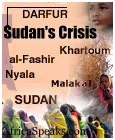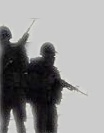 |






 AfricaSpeaks Weblog AfricaSpeaks Weblog
 Rootswomen Weblog Rootswomen Weblog
 Rootsie's Weblog Rootsie's Weblog
|
Why give out food and then bomb us?
Posted: Sunday, March 30, 2003
By Burhan Wazir, Independent/UK
Viewed from the northern edge of Zubayr, the bone-dry flatlands of the Mesopotamian plain are ablaze with Allah's wrath. Salah Mehdi, 35, watched the inferno burning in the nearby city of Basra. Close by, another sign of what Iraqis describe as "Qiyamat", the Muslim Day of Reckoning. The skies are marked by the thick, black smoke from burning oil wells.
Mehdi, a geography teacher at Zubayr Elementary School, remembers when Basra was last in flames. In March 1991, Saddam Hussein ordered his forces to storm the sprawling, ancient Shia citadel to quell an uprising.
The President-for-Life had decreed that Basra's Shias had been betrayed by "herds of rancorous traitors, who infiltrated from inside and outside the country". His fatherly hand came down; and the glorious leader crushed the rebellion. According to Mehdi, "hundreds of bodies were lying in the streets".
Twelve years later, Basra is burning once more. Inside, soldiers loyal to the Great Uncle of the Iraqi people are dispensing his punishment again. From the outside, British forces nightly shell the metropolis. Mehdi has not seen his two brothers since 18 March. Mithal, 27, an engineer, and Ali, 28, an office administrator, are being used as human shields inside Basra.
"The Iraqi soldiers are not letting my brothers and their families come out," he said. Mehdi watched British troops unload boxes of bottled water from a truck. "I don't want water," he added. "I want to know if my brothers are alive."
Nearby, others spoke of relatives in Basra. "My father is there," said Nawaf Aja, 23. "I have not seen him in a week. No one can get out. Iraqi soldiers use people like him to slow down the attack."
While Basra burns, across southern Iraq, the 23rd Pioneer Regiment is leading what amounts to an emergency humanitarian exercise in the middle of a war zone. Convoys laden with water and emergency rations leave Shabiah airbase bound for Iraqi civilian heartlands. The deployment of humanitarian supplies, in the middle of an active battle, is viewed as a "Band-aid" until non-governmental agencies are able to enter Iraq. "We cannot expect to fix everything," admitted Colonel Peter Jones, the regiment's commanding officer.
The aid drops have also been subject to attack from Iraqi forces and militia still active in the area. On Wednesday afternoon, the first such drop in the dusty town of Zubayr was disrupted by gunfire. Earlier, several hundred people fought over supplies of water. Jalil Ali, 25, a well-educated and polite trainee scientist at the Ministry for Higher Education, threw a bottle of water on to the ground. "Take it back," he said. "Why are they giving water and food when they are bombing us as well?"
Basra, at the junction of the Euphrates and Tigris rivers, marks the nexus for the British humanitarian effort. Here, most of all, the British "hearts and minds" aid effort is crucial. On Friday afternoon, the 23rd Pioneer Regiment set off for the outskirts of Basra with about 20,000 litres of water and a mobile medical unit. The mission was fraught with logistical problems from the outset. Quickly, fighting erupted among the crowd; and, as panicked soldiers threw boxes of bottled water into the crowd, one man was hit in the face. As soldiers ordered the Iraqi civilians to sit down in orderly lines, some streamed towards an ambulance.
Earlier in the day, a mother had brought forward her six-month-old baby. Miriama had suffered severe burns across 70 per cent of her body when her father had tried to light a gas lamp. After injecting a painkiller, the doctor could only look on helplessly. "I can't do anything else," she said.
Iraqi civilians, for their part, feel uniquely helpless and frustrated. "I have an illness. Can you offer me some more medicine?" said Hamid Ali, 50. I had stood chatting to him about the Iran-Iraq war.Afterwards, Ali said he felt frustrated by the humanitarian response. "We need electricity. We need a running water supply," he said.
The water shortage had to be addressed, he added.
"I see a lot of British tanks coming in my town, but they seem to pass through. Do not ignore the south. Saddam's people are still here. They are watching and waiting. You cannot leave us to them."
This is a pool report from Burhan Wazir of 'The Observer'
 Printer friendly version Printer friendly version
 Send page by E-Mail Send page by E-Mail
|








